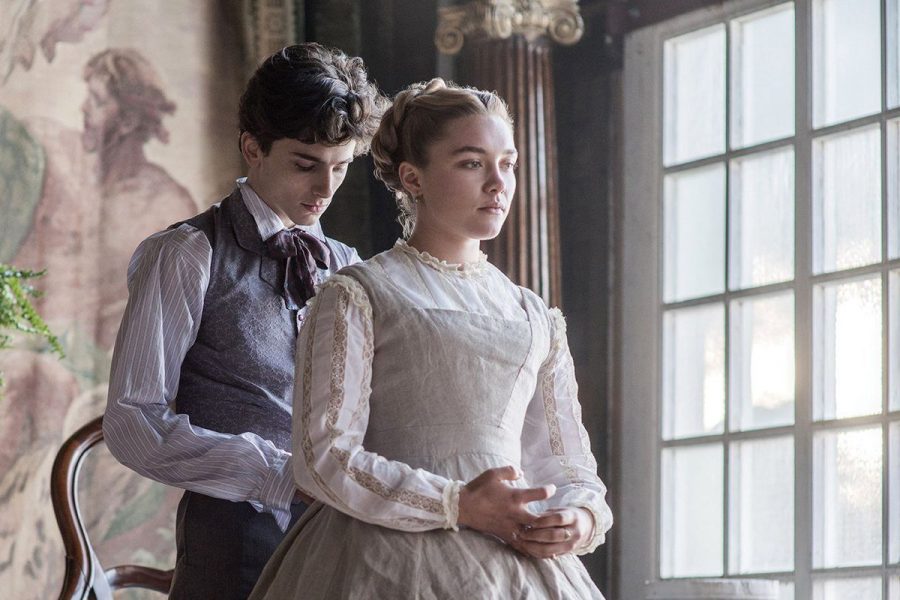Greta Gerwig’s Little Women: Amy March, Redeemed at Last
January 14, 2020
I first read Little Women in sixth grade, grasping for something to read on my brand new Kindle during a long flight. I expected a light story, a book I’d read once and quickly forget about; instead, I fell in love with the beautifully crafted characters, plot, and setting. Louisa May Alcott’s most famous novel, even more than a century later, is a triumph—a novel that explored the inner minds and lives of girls in a world that viewed them as nothing more than future wives. It is a novel that was unabashedly feminist before the word “feminism” was even coined.
Greta Gerwig’s latest adaptation of Little Women—I say latest because there seems to be one such film adaptation every thirty or so years—is a triumph as well. Of course, I should probably start this review by stating that I am biased towards Gerwig. When I watched Lady Bird last year, I immediately fell in love with Gerwig’s directing style—classic indie—and the multifaceted characters she creates. In Gerwig’s worlds, no character is a cliche. The “boy next door” is not unbearably perfect; the spoiled little sister does not remain spoiled forever.
I didn’t know what to expect when I walked into the theater; however, in all honesty; unlike many moviegoers, I had never viewed any other adaptation of Little Women. And thus I was expecting the film to be little more than what I had already known about the written-word version of Little Women—that Jo (Saorise Ronan) would be triumphant, a feminist hero for the ages; that Beth (Eliza Scanlen) would die a beautifully tragic death that would bring me to tears (which did, in fact, occur—I sobbed while groping hopelessly at my empty bag of Sour Patch Kids); that Laurie (Timothée Chalamet) would be a revelation, spoiled and wonderful and kind and isolated and welcoming all at once. And I did find all of these—indeed, Saorise Ronan’s Jo has spoiled me for any other Jo in any other adaptation. As a bookworm and aspiring author in childhood, I, like many other girls, naturally looked up to Jo. Jo, the heroine of Little Women—or so it would seem to be, even if there is no real main character besides the four March sisters as a collective. Jo, the bold one. Jo, the one who breaks boundaries fearlessly, who is prideful but vulnerable and unafraid to defy the norms—to turn down Laurie for sake of lack of love, to move away on her own in search of becoming an author, to marry the awkward German professor and not the young, handsome boy.
And like many other girls, I also hated Amy (here, played by Florence Pugh). As a child, whenever I reread the novel and came to the part where Amy, in a fit of childish anger, burned all of Jo’s writings, I would be overcome by simmering rage so fierce I would usually skip the next fifteen to twenty pages altogether. Amy was the quintessential spoiled brat, in my eyes; beautiful and sure that she would always get what she wanted in life, she was everything I hated. When I walked into the theater to watch Gerwig’s adaptation of Little Women, I expected this hatred to only be rekindled. Indeed, at some parts, it was; watching a red-faced Amy burn Jo’s manuscripts, lovingly overflowing with ink, made me burn with anger just as reading the scene had so many years ago.
But by the end of the movie, I’d grown to love Amy. Such is the power of Gerwig’s transformative, multifaceted storytelling; no character is static, and no character is wholly evil or good.
Gerwig’s Amy is an artist. In the novel, she is described as a fairly mediocre one; she cannot compare to the God-given talent of Jo. In the film, she describes her own talent in a similar manner; she declares that she cannot and will not become a painter and will simply dabble in other areas and become a sort of “accessory to society.” In reality, Amy’s paintings are nothing but mediocre—they are beautiful. But they are not revolutionary, and at the end of the 19th century, the art world is itching for a revolution. Amy strives to be bold but cannot measure up to Jo in her brashness.
Gerwig’s Amy is a dreamer. Perhaps one of the most visible strengths of the latest Little Women is Gerwig’s ability to create chemistry out of nothing but dried paint—and yes, I’m referring to the seemingly out-of-nowhere marriage between Amy and Laurie. In all honesty, I view Louisa May Alcott’s decision to marry off Laurie to Amy, of all people, as the ultimate exercise in “trolling”—just as she refused to pair off Jo and Laurie simply to please her fans, I envision her laughing maniacally with glee while scribbling out the pivotal reveal of Amy and Laurie’s marriage. But in Gerwig’s adaptation, this unlikely pairing is anything but that. Yes, Amy marries rich for economical reasons—as she has always known she must—but there is a loving spark between her and Laurie. Yes, she turns him down at first because she is tired of always being second, of always being not-quite good enough, of always being an afterthought. Yet she loves him still, and their eventual marriage seems less like an act of mere defiance by an author and more like an inevitability.
And Gerwig’s Amy is, above all, a heroine in her own right. She is not destined to be a bestselling author like Jo, nor is she the most perfect, most loving wife like Meg (Emma Watson), nor is she beatifically kind like Beth. Yet she exhibits remarkable growth—growth from the spoiled brat we all love to hate into a poised, elegant-yet-fiery woman. And after all, isn’t that what Little Women is all about?


















































































































































